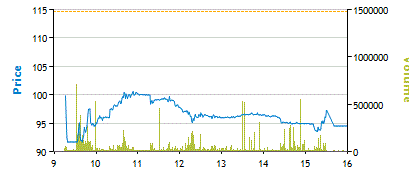Standard Chartered Bank PLC IDR which is India’s first and only IDR was mercilessly hammered after SEBI announced on Friday the 3rd of June the conversion norms into underlying. At the time of issue it was made very clear by the whole management team of Standard Chartered and the host of merchant bankers that they had employed to sell the issue that conversion would happen after one year and that the same would be allowed for the purpose of selling the share. What this effectively meant that shares of the bank could not be held as shares and had to be compulsorily sold.
Prior to this announcement the IDR’s were actively traded and had decent volumes but the average was below a million shares. What one saw on Monday was a near panic on the counter and it not only made a new 52 week low it also was at a 20% down circuit for some time.
| Exchange | Prev Close | Open | High | Low | Close | Net Change | % Gain/loss | Wt. Avg | Volume | Delivery | Del %age |
| BSE | 114.65 | 100.00 | 101.70 | 91.75 | 94.55 | -20.10 | -17.53 | 95.92 | 18265974 | 10716957 | 58.67 |
| NSE | 114.85 | 100.00 | 101.70 | 91.90 | 95.05 | -19.80 | -17.24 | 95.90 | 32177124 | 21994990 | 68.36 |
| Total | 50443098 | 32711947 | 64.85 |
The combined volume on the two exchanges was a staggering 504.43 lac IDR’s against an average of below 10 lac shares historically. The delivery volume was 327.12 lac IDR’s or a staggering 64.85%. The sellers were basically FII’s, arbitrage funds and some of the names of the sellers are as follows: –
| Seller | Quantity | Rate |
| Credit Suisse | 34,98,404 | 94.37 |
| Credit Suisse | 20,51,004 | 97.45 |
| Deutsche Securities | 13,00,000 | 96.32 |
| Swiss Finance Corporation | 70,05,716 | 95.70 |
| Swiss Finance Corporation | 45,45,367 | 95.29 |
| TOTAL | 1,84,00,491 |
On the buy side there were two institutions who bought as well.
| ICICI Prudential | 29,81,703 | 96.98 |
| Swiss Finance Corporation | 7,50,000 | 93.65 |
| TOTAL | 37,31,703 |
 The price chart shows that the stock hit the down circuit right at the beginning of the day’s trade. It recovered from there and made the days high. Thereafter the share again drifted down and saw huge volumes throughout the day.
The price chart shows that the stock hit the down circuit right at the beginning of the day’s trade. It recovered from there and made the days high. Thereafter the share again drifted down and saw huge volumes throughout the day.
The panic was across the board and people have sold like there is no tomorrow. The identity of a very small percentage of the buyer is known while the major portion remains still unknown. The new SEBI directive says that the IDR would only be convertible into the underlying if the IDR trading volume becomes “ILLIQUID”. The definition of the same is that in a block of six months the traded volume should be less than 5% of the outstanding IDR’s.
This definition brings about a trick situation. When the volume falls, and there is a substantial price arbitrage available, there would be buying interest which would increase volumes and therefore the illiquid status would be breached.
The announcement by SEBI on Friday evening brings one to a moot point whether this amounts to leaving investors high and dry with a mere one week left for conversion of IDR’s into underlying. It also brings up an interesting question whether shareholders or investors have been misled into buying something where they believed and opportunity to make money existed and the rules have been changed.
Yet another way of looking at it is that SEBI was very keen on introducing IDR’s into India and launched the first issue without understanding the implications or effect that this could have later on. Today they have come out with rules which give an impression that the effort is to contain the outflow of money from India. If that be the case as the figures show FII’s have been big sellers and the idea stands defeated.
I would like to raise an issue through this article, that whether the act of the company and its merchant bankers in selling this issue without having clarity on the conversion of IDR into underlying shares amounts to miss-selling or not. Do investors who have applied and lost huge money have reason to complain against the company and its merchant bankers? Could a class action suit like in the case of Mahindra Satyam be brought against this company and be settled as the law allows for US investors? Will the Indian shareholders be left twiddling their thumbs because there is no such law in this land? Will the mutual funds who have to take a stand when minority shareholders’ interests are hurt or violated or will they just keep quiet and let their investors suffer as well?
I believe these question need to be answered by Standard Chartered and their merchant bankers and in the greater interest of the capital markets they must make a representation to the regulator on the issue.



